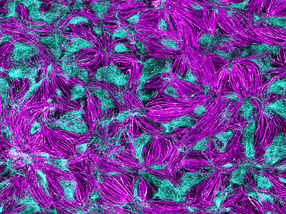Bayer Starts Phase III Trial with Florbetaben
Detection of beta-Amyloid plaques in Alzheimer patients possible
Bayer Schering Pharma AG is progressing with the development of florbetaben to support Alzheimer diagnosis. On the occasion of the 95th Scientific Assembly and Annual Meeting of the Radiological Society of North America (RSNA), the company announced the enrollment of first patients in an international clinical Phase III trial to evaluate the efficacy and safety of florbetaben (BAY 94-9172) PET imaging in the detection of beta-Amyloid deposition in the brain. The trial will include both subjects with and without manifest dementia (e.g. Alzheimer’s disease [AD]). In the previous Phase II trial, florbetaben has successfully demonstrated its potential to detect beta-Amyloid deposition in the brain as a pathological hallmark of disease in AD patients.
“Currently, there is no diagnostic tool on the market to facilitate the in vivo diagnosis of the various dementia types including Alzheimer’s disease,” said Dr. Thomas Balzer, Head of Global Clinical Development Diagnostic Imaging at Bayer Schering Pharma. “This Phase III study could proof that florbetaben can be used as a new tool to detect beta-Amyloid depositions in the brain in vivo. The ability to image beta-Amyloid depositions already during life, is expected to be beneficial for a better and earlier diagnosis of this devastating disease and to eventually enable also an earlier and more specific treatment.”
The pivotal Phase III trial is a worldwide open-label, multi-center, non-randomized single dose study to assess the safety and to determine the sensitivity and specificity of the visual and quantitative assessment of regional tracer uptake of florbetaben in the brain using PET imaging. Approximately 400 individuals are expected to be enrolled in this study. The florbetaben uptake pattern will be visually assessed by independent, nuclear medicine physicians blinded to the clinical diagnosis and all other clinical data. The images will be compared for the presence or absence of cerebral beta-Amyloid respective to corresponding histo-pathological specimens. Both volunteers without dementia and patients with dementia will be included, therefore enrolling subjects with either a high probability of cerebral beta-Amyloid deposition (e.g. subjects with AD) or a low probability of cerebral beta-Amyloid deposition (e.g.non-demented volunteers).
The primary and secondary objectives of the trial are the evaluation of the sensitivity and specificity of the visual assessment of regional tracer uptake in the florbetaben PET images compared to histological verification as well as the quantitative assessment of regional tracer uptake. The primary completion of the study is anticipated for 2011. However, due to histopathology examinations the study is not anticipated to be completed before 2014.
Organizations
Other news from the department research and development

Get the life science industry in your inbox
From now on, don't miss a thing: Our newsletter for biotechnology, pharma and life sciences brings you up to date every Tuesday and Thursday. The latest industry news, product highlights and innovations - compact and easy to understand in your inbox. Researched by us so you don't have to.
























































